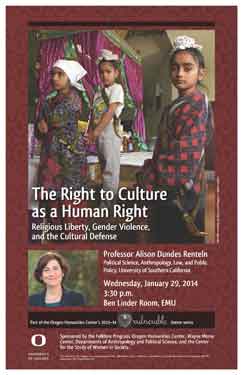 Ben Linder Room
Erb Memorial Union
1222 E. 13th Ave.
Ben Linder Room
Erb Memorial Union
1222 E. 13th Ave.
Presented by Alison Dundes Renteln, Professor of Political Science, Anthropology, Law, and Public Policy, University of Southern California
Immigrants often have to give up their customs to conform to the standards of their new society. But should newcomers to the U.S. be expected to discard their traditions, even though the right to culture is a basic human right? What are reasonable limits on the right to culture?
Should immigrants be prohibited from eating a dog because Americans consider the animal a “pet”? Should symbols of religious identity like headscarves be allowed in public schools? Should the loud religious sounds such as the call to prayer be exempt from noise laws? How should the law handle traditions like child marriage and honor killing? While cross-cultural understanding is crucial, the question is how much weight courts should give culture when customs clash with the law. This lecture discusses how to draw the line.
Prof. Renteln's publications include The Cultural Defense (Oxford, 2004, Choice Outstanding Book), Folk Law (University of Wisconsin, 1995), Multicultural Jurisprudence (Hart, 2009), and Cultural Law (Cambridge, 2010). Currently, she teaches international law and human rights.
A graduate of Harvard (History and Literature), she has a Ph.D. in Jurisprudence and Social Policy from the University of California, Berkeley and a J.D. from the USC Gould School of Law. She has taught judges, lawyers, court interpreters, jury consultants, and police officers at meetings of the American Bar Association, National Association of Women Judges, North American South Asian Bar Association, American Society of Trial Consultants, and others. She has collaborated with the UN on the implementation of the Convention on the Rights of Persons with Disabilities, lectured on comparative legal ethics in Bangkok and Manila at ABA-sponsored conferences, and served on several California civil rights commissions and the California committee of Human Rights Watch. Currently she is a Fellow at Stanford’s Center for Advanced Study in the Behavioral Sciences.
Sponsored by the Folklore Program, Oregon Humanities Center, Wayne Morse Center, Departments of Anthropology and Political Science, and the Center for the Study of Women in Society.

